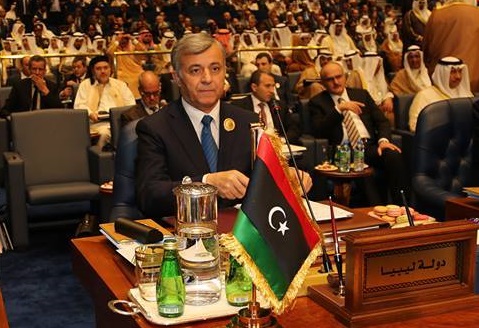By Ahmed Elumami.

Tripoli, 26 March 2014:
The High National Election Commission will be instructed by the General National Congress (GNC) . . .[restrict]before the end of the month to hold elections for its proposed successor, the House of Representatives, Congress President Nuri Abu Sahmain has again pledged.
Speaking at the two-day Arab Summit in Kuwait yesterday, he said that the House of Representatives would be elected soon and that the new election law would state when the election was to be held and the system that was to operate.
His pledge suggests that the election law will be debated and voted on Sunday – the next occasion and the last this month that the GNC will meet in full session. However, there is no indication, as yet, that Congress is ready to decide on dissolving itself or that there is consensus on the details of a new election law, both as to date and issues such as whether the new House should contain political parties.
In his speech in Kuwait, Abu Sahmain also thanked to those Arab states that supported Libya during and since the revolution and those that had taken part in the recent Rome Conference on Libya.
However, at a summit which itself appeared to lack coherence and purpose, with divisions between Arab states more pronounced that usual, Abu Sahmain told his audience that the social fabric of Libya was still cohesive and that the Libyans had begun to lay the foundations of their state.
Libya’s reconstruction featured in the summit’s final communiqué today. Those present expressed “their solidarity with Libya in preserving its national sovereignty and independence while rejecting all attempts aimed at undermining its stability and territorial integrity”. The statement added that “they also expressed Libya’s efforts for reconstruction and building of state institutions including the drafting of a constitution and activation of national unity”.
On the sideline of the summit, Abu Sahmain held talks with a number of Arab leaders on military cooperation, the fight against terrorism and, where appropriate, border protection. These included the Emir of Kuwait Sheikh Sabah Al-Ahmad Al-Jaber Al-Sabah, Somalian President Hassan Sheikh Mohamoud, Speaker of Algeria’s upper House of the Nation Abdelkader Bensalah, Sudanese president Omar Al-Bashir, head of the Syrian National Coalition Ahmed Jarba, Mauritanian President Mohamed Ould Abdel Aziz, Tunisian President Moncef Marzouki and the Iraqi Vice-President Khudeir Al-Khuzaie. [/restrict]







